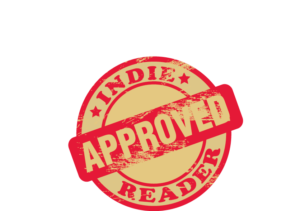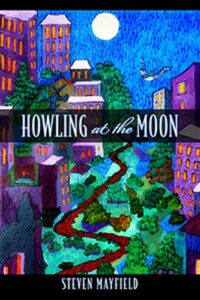
Treasure of the Blue Whale received a 4+ star review, making it an IndieReader Approved title.
Following find an interview with author Steven Mayfield.
What is the name of the book and when was it published?
Treasure of the Blue Whale (Regal House Publishing): Scheduled release 4.1.20.
What’s the book’s first line?
The Whale was middle-aged—a great, block-headed beast nearly forty years-old—and he bore numerous
scars, the bushy spray from his blowhole yet to be quieted by a whaler’s harpoon.
What’s the book about?
In this whimsical, often funny, Depression-era tale, young Connor O’Halloran decides to share a treasure he’s discovered on an isolated stretch of Northern California beach. Almost overnight, his sleepy seaside village is comically transformed into a bastion of consumerism, home to a commode with a jeweled seat cover, a pair of genuinely fake rare documents, a mail-order bride, and an organ-grinder’s monkey named Mr. Sprinkles. But when it turns out that the treasure is not real, Connor must conspire with Miss Lizzie Fryberg and a handful of town leaders to save their friends and neighbors from financial ruin. Along the way, he discovers other treasures in the sometimes languid, sometimes exciting days of that long-ago season. He is rich and then he isn’t. He learns to sail a boat and about sex. He meets a real actor. He sneaks into villainous Cyrus Dinkle’s house and steals his letter opener. He almost goes to jail. He loves Fiona Littleleaf. He finds a father. And best of all, he and little brother, Alex, reclaim their mother from the darkness of mental illness.
What inspired you to write this book?
I was living in San Francisco and some friends came to dinner one night. They had spent the weekend in a village north of the city and told me a story about whale ambergris that had supposedly washed up on the beach many years ago. At the time, ambergris was prized by perfumers and quite valuable. The townsfolk thought they’d be rich, then learned that the material was not ambergris, but something tossed from a passing freighter. Upon hearing the tale, I knew there was a book there and created the town of Tesoro and the people who borrow against their shares of ambergris only to learn that it’s mostly something thrown off a Portuguese ship named the Baleia Azul—the Blue Whale.
What’s the main reason someone should read this book?
I want people to appreciate the themes—what unexpected wealth does to people and what happens when it’s taken away, how people can find the best in themselves, and how coming-of-age is timeless no matter how much each generation might believe otherwise. I also want the reader to be entertained and transported; hence, the quirky people, the funny predicaments, the mystery, the poignancy.
What’s the most distinctive thing about the main character?
He’s really two characters: Connor O’Halloran, the 91-year-old who narrates the story and Connor O’Halloran, the ten-year-old who lives it. The old man is perspicacious and occasionally cynical, the boy precocious and occasionally chippy.
Who does the character remind me of?
Perhaps Lucius Priest in Faulkner’s The Reivers?
If they made the book into a movie, who would you like to see play the main character(s)?
I imagine a film would employ voice-over narration and a number of actors could play that role. I suspect he doesn’t need the work, but what the heck, let’s go with Tom Hanks. Mrs. C. Herbert Judson could be played by my wife or Nicole Kidman, Miss Lizzie Fryberg by
Christine Baranski, and Cyrus Dinkle by Brian Cox. All that said, I’m sure a casting director would do a much better job than I.
When did you first decide to become an author?
I started writing bad poetry at nine and began my first novel at thirteen. Here’s some advice for young people. If you are in the eighth grade and begin a novel, do not tell your classmates. They’ll break your glasses. I’m not kidding.
Is this the first book you’ve written?
I published a few things many years ago and then quit writing fiction to go to medical school. Over the next twenty years, I published about 40 scientific articles, abstracts, book chapters, or solicited reviews, then returned to writing fiction in the early 90s. Since then I’ve published a number of short stories and worked as an editor/ghost-writer from 2004-2008. I decided to just do my own stuff after that and Howling at the Moon was published in 2010.
I’ve got three other books on the shelf, (The Waiting Room, Delphic Oracle U.S.A., and A Ghost’s Tale) two begun before Treasure of the Blue Whale. I had planned for Delphic Oracle U.S.A. to come out before “Treasure,” but my agent really liked the story of Connor and the whale
and Tesoro, California, so we submitted it first. It turned out to be a good thing as I realized during the editing of “Treasure” that “Delphic Oracle” needed more work. I’m just about ready to submit it.
What do you do for work when not writing?
I was a neonatologist for many years. Now, I manage our investments, write, and cater to my needy dogs. They’re so neurotic!
How much time do you generally spend on your writing?
About 2-4 hours/day. I’d spend more, but my wife is more fun and interesting than writing.
What’s the best and hardest part of being an indie?
Simply getting the work out there and published is the hard part. It’s a business and one has to promote and market. The best part is same as being a non-indie: the actual writing.
What’s a piece of advice to give other authors?
I think advice from me is presumptuous. Nevertheless, here goes: They say you should write what you know. I think you should know what you write. Alastair Maclean wasn’t a mountain climbing commando. He researched them in the library and wrote The Guns of Navarone. The second bit of advice would be for young writers: Give in to your authentic voice. We all begin by imitating, but at those magical times when the words flow without effort, understand that your authentic voice is trying to fight through all the imitations. Let it out, even if the result is less Margaret Atwood and more Margaret Q. Amateur.
Would you go traditional if a publisher came calling?
I have a publisher (Regal House), so I guess the question would be relative to size. If Random House came calling, would I leave Regal House? At this point, no. It’s about relationships. I like working with Regal House and I believe in their mission. If I were lucky enough to pen a best-seller, I’d rather see the profits in their pocket.
Is there something in particular that motivates you (fame, fortune)?
I think both were considerations when I was twenty. No more. It’s about the work—the stories and the readership. After I published Howling at the Moon, which had some dark elements, I decided that it was possible to forward serious points without making the reader feel wretched. That’s my goal now and I want to write as well as I can and to evoke feeling in the reader—to have him/her get what I want to communicate. Frankly, it shouldn’t be all that hard. I’m pretty transparent.
Which writer, living or dead, do you most admire?
Just one? Holy Cow! I’m in awe of Anthony Doerr’s talent, but have been heavily influenced by Sinclair Lewis, Muriel Spark, Kurt Vonnegut, O. Henry, Charles Dickens, Mark Twain, Jean Shepherd, John Steinbeck, and John Cheever among others.
Which book do you wish you had written?
Just one? Double Holy Cow! Okay, okay…Cannery Row by John Steinbeck.

